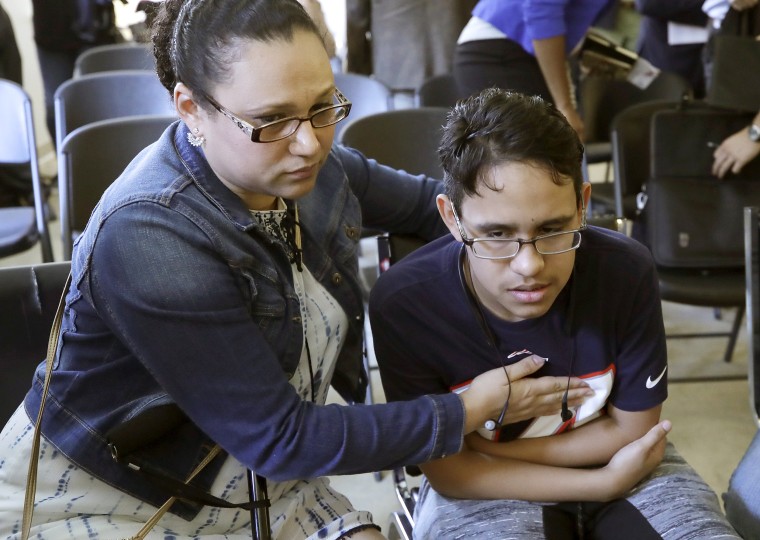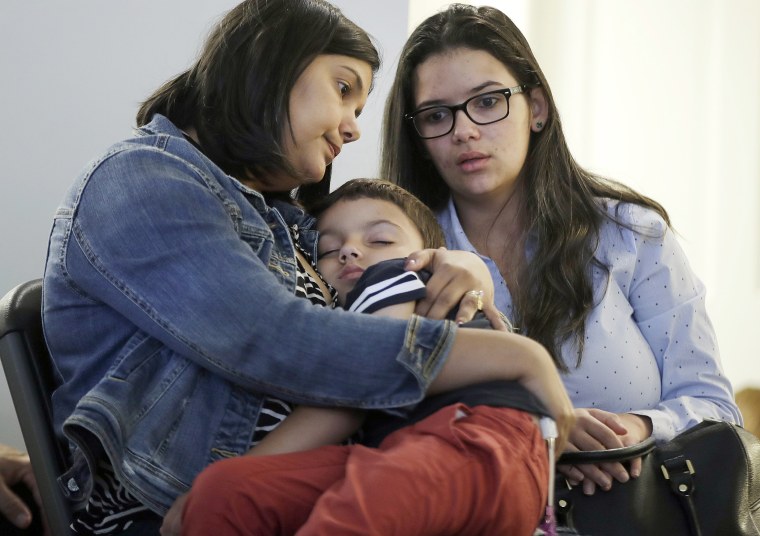
Each
year, the U.S. gets about 1,000 applications from immigrant families in
the U.S. seeking permission to stay in the country and not face
deportation so family members can continue lifesaving medical care that
is not available in their home countries.
But
the Trump administration recently told families who were granted
permission to stay for medical care that their permission to stay has
been rescinded and they have 33 days to leave the country. The policy,
which was not publicly announced, is being applied retroactively to any
requests filed on or before Aug. 7.
In a conference call Thursday with reporters, advocates and Democrats expressed outrage over the rule.
“This is a new low even for Donald Trump,” Rep. Ed Markey, D-Mass., said in a conference call with reporters Thursday.
Among those facing deportation is Jonathan Sanchez, 16, who has cystic fibrosis.
His
mother, Mariela Sanchez, told NBC 10 in Boston that her family arrived
in the United States in 2016 and she had recently applied for the
medical exemption. After losing a daughter to the hereditary and
incurable disease because doctors in Honduras did not diagnose it, she
knows what would have happened to her son if he was not getting the care
in the U.S.
“He would be dead,” she told the station.
The
Department of Homeland Security did not immediately respond to a
request for comment from NBC News. In a previous statement, United
States Citizenship and Immigration Services (USCIS) has said that it was
no longer considering nonmilitary requests for deferred action "to
focus agency resources on faithfully administering our nation’s lawful
immigration system."
“This administration is now deporting kids
with cancer. Perhaps that is why it was too ashamed to announce this
policy change publicly," said Markey, who has been trying to draw
national attention to the issue since it was first reported in Boston by WBUR-FM, a public radio station.
The
change was not made public and members of the public were not given a
chance to provide comment before it went into effect. Families simply
received letters telling them they had 33 days to leave.
“They
are telling these people they need to leave on their own,” Anthony
Marino, director of immigration legal services,said on MSNBC’s “The
Rachel Maddow Show” about the families with seriously ill relatives now
facing deportation.
“I don’t know how they
expect parents to pull their children from hospital beds, disconnect
them from lifesaving treatments and go some place where they are know
they are going to die," said Marino. "But that is what they are telling
them to do.”
In Miami, attorney Milena Portillo told The Miami Herald
that families who have applied for the medical deferments include a
girl with an eye malignancy, a girl with cerebral palsy and the father
of three children — who are American citizens — who has a terminal liver
illness.
“We as a country, we are losing
our humanitarian side,” Portillo told the Herald. “We’re not reviewing
case by case, but we’re just giving a blanket ‘no’ to everyone.”
Rep.
Ayana Pressley, D-Mass., cited in the Thursday call the case of Samuel,
a five year old boy from Brazil. She said he is unable to eat solid
food and without care at Boston Children’s Hospital will not be able to
receive the nutrients he needs to live.

"With
this decision, again this administration has hit a new low," Pressley
said. "To be fighting for your life, imagine on top of that facing
deportation."
The American Immigration Lawyers Association
called on the USCIS to reverse the policy change. It has asked people to
contact elected leaders to change it.
A
backlash over the changes has led to confusion over which Department of
Homeland Security agency, the USCIS or Immigration and Customs
Enforcement, must enforce the new policy, as the agencies have pointed
to each other as having jurisdiction.
Medical deferrals are not the only denials imposed by the administration. USCIS told NBC News
that it applies to all other deferred action requests outside of the
military and immigrants enrolled in the Deferred Action for Childhood
Arrival program or DACA.
The policy change
is another in a series of actions the administration has taken that have
had direct impact on children, both who are immigrants and those who
are U.S. citizens.
The administration has taken numerous children from their parents at the border and some have yet to be reunited.
The administration changed the so-called public charge rule so that immigrants wanting a green card or asking to move to the U.S. must prove they are unlikely to ever need public assistance, such as access to health care.
In the time the rule was being drafted and copies of it were leaked, immigrant parents with American citizen children dropped out of programs such as the Special Supplemental Nutrition Program for Women, Infants, and Children, known as WIC,
which provides health care and nutritious food for very young children,
even though their children have a right to such programs.
“There
can be no other explanation for why you would target such a small and
vulnerable community other than if your goal was to spread fear and
hardship,” Rep. Judy Chu, D-Calif., said.
“This
is all in character for an administration that is separating families
and abusing children in prison camps at the border," Chu added.
Chu
has filed a bill to defund the public charge rule but said “it’s clear
that this administration will not stop looking for any opportunity to
wage war on immigrants.”



